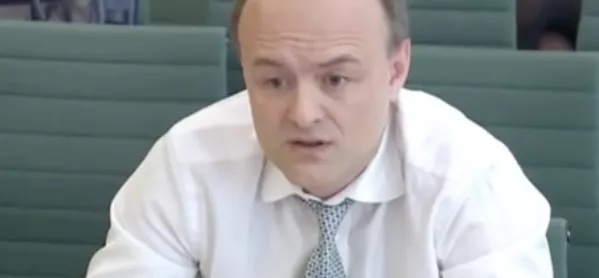- Home
- ‘Dominic Cummings shows that sorry is the hardest word’
‘Dominic Cummings shows that sorry is the hardest word’

As a teacher and as a parent, the current Dominic Cummings story epitomises an issue that has been troubling me for a while.
We are seeing the death of a word that is crucial to the functioning and betterment of a decent society: the word “sorry”.
Mr Cummings is by no means the first public figure to avoid at all costs using the word “sorry” or issuing an apology. But his is, arguably, the most obvious and contentious example in our country’s modern history.
What is it that has made this vital word so unutterable? Is it our increasingly litigation-influenced culture or an absolute need not to relinquish any power?
Learning from our mistakes
As soon as there is a hint of an admission of guilt, there is the possibility that right is no longer on your side and that your deeds or words caused upset and injury to others. You can be blamed, fired or sued.
There is also a subtle difference between saying sorry and making an apology. When you apologise, you admit wrongdoing; when you are sorry, you admit to feeling regret.
It is a fine line between the two and, for that reason, both have become simultaneously and equally unusable in public office and the corporate world.
The reason I find this so worrisome is that the lesson we are teaching children now is how to be less than perfect, to cause hurt or harm, to be thoughtless, but still to be right. To remain free from any guilt, reprimand or blame.
To act, in Mr Cummings’ carefully-chosen words, “reasonably and legally”. Or, as similarly stated by our prime minister, “responsibly, and legally, and with integrity”.
The power of saying ‘sorry’
When I discuss this incident in school with the teenagers still attending, key workers’ children and vulnerable young people whose numbers have been steady and are now slowly swelling, what do I promote as truth and as right?
Mr Cummings made the rules, decided the lockdown laws. He drove 250 miles for childcare, and then again with his child in the car he drove to a beauty spot and back to “test his eyesight”. But he didn’t make any mistakes apparently... So he is not sorry. He has nothing to be sorry for. He has no apology to give.
Remember when you were young, hearing: “Saying sorry means that you won’t do it again”? So, what happens when we stop saying sorry? Do we continue to make the same mistakes?
Or worse, do we genuinely not acknowledge them to be errors? If so, then by implication we cannot learn from the behaviour; we will repeat it. If we have come to be a culture that cannot admit to mistakes, then we cease to improve.
When we recognise a mistake and apologise, that, in itself, becomes a deed of reflection for improvement:
“I am sorry: it was stupid; it was careless; it was thoughtless; irresponsible. I could have been better than I was. I was less than perfect. I was wrong. I hurt you. I am sorry. I apologise. I have learned from my behaviour. I accept there are consequences to my actions. I won’t do that again.”
People make mistakes and must, necessarily, be forgiven.
But what we are coming to is a society in which those in power simply don’t make “mistakes”. If they don’t admit errors, then the wrongdoing remains entirely in the eye of the beholder. And if a point of view has the power of government backing it up, then it is right. Is that where we are now?.
As long as Mr Cummings stands by his line of acting with integrity, following both the letter and the spirit of the law, with the backing of Mr Johnson and his significant parliamentary majority, then they can do the same thing, and similar, again, and again, and again.
Throwaway apology
Mr Cummings did, in fact, say sorry: “Sorry I am late,” to start his press conference.
It saddened me that he could so easily, airily, utter the word for this, without seeing the benefit of its use for the act that has caused much greater upset.
His 30-minute delay did not require a preprepared speech to the nation and cause rifts in the upper echelons of power, therefore “sorry” can be thrown away on it.
Mr Cummings cannot deny that his actions caused pain to many others who made sacrifices: so why not simply say sorry? And if nobody in power can apologise any more, how can I expect it of the children at school?
How will I teach a most fundamental life lesson: it is OK to make mistakes, it is a crucial component part of learning, as long as from them you grow in wisdom and knowledge to be better?
If your actions have negative consequences, intended or not, then you can help assuage any upset by acknowledging that.
Sorry should not be the hardest word, but it does appear to have become almost impossible.
Deborah Hollingsworth is a secondary school teacher in East London. She tweets @debs_cares
Keep reading for just £1 per month
You've reached your limit of free articles this month. Subscribe for £1 per month for three months and get:
- Unlimited access to all Tes magazine content
- Exclusive subscriber-only stories
- Award-winning email newsletters



